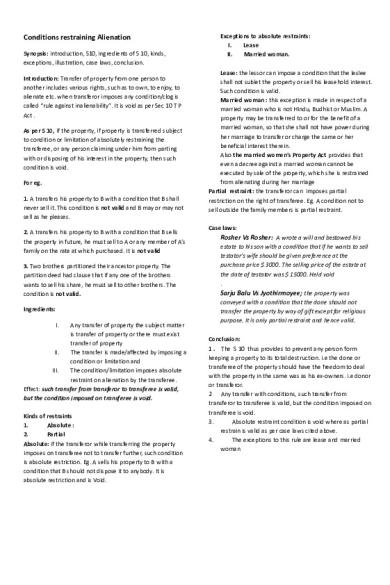S 10 condition restraining Alienation PDF

| Title | S 10 condition restraining Alienation |
|---|---|
| Author | KrishnaMurthy Potnuru |
| Course | Property law |
| Institution | Karnataka State Law University |
| Pages | 1 |
| File Size | 69.2 KB |
| File Type | |
| Total Downloads | 86 |
| Total Views | 118 |
Summary
Revision notes for Property law...
Description
Conditions restraining Alienation Synopsis: introduction, S10, ingredients of S 10, kinds, exceptions, illustration, case laws, conclusion. Introduction: Transfer of property from one person to another includes various rights, such as to own, to enjoy, to alienate etc. when transferor imposes any condition/clog is called “rule against inalienability”. It is void as per Sec 10 T P Act . As per S 10, if the property, if property is transferred subject to condition or limitation of absolutely restraining the transferee, or any person claiming under him from parting with or disposing of his interest in the property, then such condition is void. For eg. 1. A transfers his property to B with a condition that B shall never sell it. This condition is not valid and B may or may not sell as he pleases. 2. A transfers his property to B with a condition that B sells the property in future, he must sell to A or any member of A’s family on the rate at which purchased. It is not valid 3. Two brothers partitioned their ancestor property. The partition deed had clause that if any one of the brothers wants to sell his share, he must sell to other brothers. The condition is not valid. Ingredients: I.
Any transfer of property the subject matter is transfer of property or there must exist transfer of property II. The transfer is made/affected by imposing a condition or limitation and III. The condition/limitation imposes absolute restraint on alienation by the transferee. Effect: such transfer from transferor to transferee is valid, but the condition imposed on transferee is void. Kinds of restraints 1. Absolute : 2. Partial Absolute: if the transferor while transferring the property imposes on transferee not to transfer further, such condition is absolute restriction. Eg. A sells his property to B with a condition that B should not dispose it to anybody. It is absolute restriction and is Void.
Exceptions to absolute restraints: I. Lease II. Married woman. Lease: the lessor can impose a condition that the leslee shall not sublet the property or sell his leasehold interest. Such condition is valid. Married woman : this exception is made in respect of a married woman who is not Hindu, Budhist or Muslim. A property may be transferred to or for the benefit of a married woman, so that she shall not have power during her marriage to transfer or charge the same or her beneficial interest therein. Also the married women’s Property Act provides that even a decree against a married woman cannot be executed by sale of the property, which she is restrained from alienating during her marriage Partial restraint: the transferor can imposes partial restriction on the right of transferee. Eg. A condition not to sell outside the family members is partial restraint. Case laws:
Rosher Vs Rosher: A wrote a will and bestowed his estate to his son with a condition that if he wants to sell testator’s wife should be given preference at the purchase price $ 3000. The selling price of the estate at the date of testator was $ 15000. Held void .
Sarju Balu Vs Jyothirmoyee; the property was conveyed with a condition that the done should not transfer the property by way of gift except for religious purpose. It is only partial restraint and hence valid. Conclusion: 1 . The S 10 thus provides to prevent any person form keeping a property to its total destruction. i.e the done or transferee of the property should have the freedom to deal with the property in the same was as his ex-owners. i.e donor or transferor. 2 Any transfer with conditions, such transfer from transferor to transferee is valid, but the condition imposed on transferee is void. 3. Absolute restraint condition is void where as partial restrain is valid as per case laws cited above. 4. The exceptions to this rule are lease and married woman...
Similar Free PDFs

Condition physique
- 21 Pages

Marxism and Alienation Essay
- 9 Pages

Bloque S - Nota: 10
- 24 Pages

S tema 10 20 21 - Apuntes 10
- 6 Pages

DE- Don\'t care condition
- 18 Pages

The Postmodern Condition Summary
- 1 Pages

Tutorial 10 - ACL s 237
- 5 Pages

Health Assessment Skin Condition
- 10 Pages

Nervous condition sparknotes
- 11 Pages

Ten Percent Condition
- 5 Pages

Hawkins-Simon condition
- 5 Pages

1.Condition warranty
- 3 Pages

Incipit condition humaine
- 3 Pages
Popular Institutions
- Tinajero National High School - Annex
- Politeknik Caltex Riau
- Yokohama City University
- SGT University
- University of Al-Qadisiyah
- Divine Word College of Vigan
- Techniek College Rotterdam
- Universidade de Santiago
- Universiti Teknologi MARA Cawangan Johor Kampus Pasir Gudang
- Poltekkes Kemenkes Yogyakarta
- Baguio City National High School
- Colegio san marcos
- preparatoria uno
- Centro de Bachillerato Tecnológico Industrial y de Servicios No. 107
- Dalian Maritime University
- Quang Trung Secondary School
- Colegio Tecnológico en Informática
- Corporación Regional de Educación Superior
- Grupo CEDVA
- Dar Al Uloom University
- Centro de Estudios Preuniversitarios de la Universidad Nacional de Ingeniería
- 上智大学
- Aakash International School, Nuna Majara
- San Felipe Neri Catholic School
- Kang Chiao International School - New Taipei City
- Misamis Occidental National High School
- Institución Educativa Escuela Normal Juan Ladrilleros
- Kolehiyo ng Pantukan
- Batanes State College
- Instituto Continental
- Sekolah Menengah Kejuruan Kesehatan Kaltara (Tarakan)
- Colegio de La Inmaculada Concepcion - Cebu


